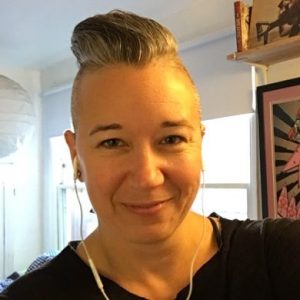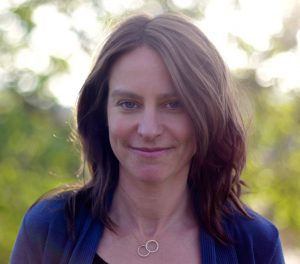
by Jenna | Dec 27, 2016 | Guest Posts
Today we're continuing my "This Writer's Life" series, in which you get to meet some of my community members and take a look inside their writing lives. If you're just joining us, I encourage you to also check out the pieces about Rebecca, Frani, and Rick.
Today we're joined by Foenix Ryder, a writer who found her home in Middle Grade fiction.
Meet Foenix Ryder: A San Franciscan Film Freelancer and Middle Grade Novelist
I've known Foenix for almost two years now. It's been such treat to have her participating in my writing community. She's the kind of writer whose enthusiasm, energy, and positivity is always present, even when the challenges of writing rear up. I love her determination and passion for her writing, and I'm thrilled to be helping her get her words out into the world.
Not only do we work together in the writing community, but I also have the pleasure of coaching Foenix around building her writer's platform. I asked Foenix to tell us more about her writing and what she's learned over the last several years — including how to break down the overwhelming tasks of a major writing project.
 What kind of writing do you do, and where are you in your writing process?
What kind of writing do you do, and where are you in your writing process?
I love Middle Grade and Young Adult stories whether they’re action, adventure, fantasy, coming of age or anything else in those genres. Naturally, that’s what I’m drawn to write: Stories where kids and teens can get immersed and relate -- and hopefully be inspired and encouraged when they read.
Right now I'm on the verge of starting the third draft of my second novel. After struggling for a few weeks with a major element in my story, I realized I needed to pause to study the conventions and expectations of fantasy stories so I can further develop the world I've created and the rules within it.
In some ways it feels like I’m “taking a vacation” from my story and avoiding the work. But I’m reminding myself that I am and always will be developing as a writer. The stepping away to learn more about my genre and craft will only empower me to tell the best story I can. And that’s what we are all here to do.
How has your writing practice changed since you've been in the writing community?
Oh wow... it’s changed immensely! Before the writing community, over the course of six years, I wrote and revised my first novel. It actually still needs a major overhaul, but it was written in bits and pieces, from different places in the story, and most days it felt like I was struggling just to get words on the page.
Since joining the writing community in March 2015, where I was instantly welcomed into a warm community of other writers, my practice has become almost daily. Writing my second novel while in the writing community, I feel like I finally have a rhythm. I create a daily goal, sit down and write, and then check in on the writing community site. I feel grounded and supported by my group every single day, which helped me write the first draft of my second novel in 7 months!
That’s not to say there haven’t been moments when I struggled, but now I have a space with other writers where I can voice my challenges and get encouragement. That helps keep the excitement going when things are great or get it going again when things are difficult.
I also love going to the daily writing sprints where I can jump online, say briefly what I’ll be working on, and completely focus on what I’m working on for one hour. The sprints have created a foundation for me to begin each day while also giving me a moment to think about what I would like to accomplish before diving into the writing.
What have you learned about yourself as a writer ?
I have learned so much over the past seven years I’ve been writing. For instance, I've learned that I do my best writing in the morning, and ideally write from 9 a.m. to 1 p.m. each day.
I've also learned to create a timeline/calendar for myself at the beginning of each draft, section, or when I’m starting something new to help me stay on track. It helps me see how much time I need to accomplish my goal and what I need to get done each day. I have also learned to let go of worrying if someone is going to like my stories or that I don’t write like other writers that I admire. I can only tell my stories as best as I can. And it is my duty to write these stories.
And something huge I am just starting to take in is that I have a tendency to see a project in its enormity and can get overwhelmed thinking I need to get it all done TODAY! But Jenna has helped me see the impossibility of that and instead break things down into much smaller chunks in order to achieve something in a realistic way. This has taken so much stress off of me while helping me accomplish small tasks that add up to a larger piece of the storytelling puzzle.
How much do you write, and where do you typically write?
I have a unique life as a freelancer in the film industry where I sometimes have 12-hour plus days for a few weeks and then I have a chunk of time off. When I’m off, I have time to dive into my writing and be fully present. So when I’m not immersed in “work work” I typically write four hours a day, Monday through Friday. I find it’s the perfect amount of time for me -- anything past 4 hours, I just start to fizzle out.
I write in an artist's studio in the Mission in San Francisco. It’s a private room I share with another artist inside a building where all types of artists have spaces. My half of the room is like a small apartment with a cozy couch, a soft blanket, some china lanterns, and a cool pirate ship kite I recently bought on the beach in Bali.
In order to get into my writing “dreamspace,” I must be curled up into a ball, legs pulled to my chest, body hunched over, blanket around me, with my headphones on playing the constant rumble and downpour of “Thunderstorms.” This allows me to tune everything out except the adventure movie I see inside my head while writing by hand as fast as I possibly can.
What does a successful writing day look like for you?
A successful writing day is one where I have either gotten through the section I wanted to get through, have worked out some kind of problem in my story, or where I wrote so fast, I felt energy flowing through me, writing while the story just poured from me. Those days, I walk away feeling vibrant and excited and truly feel like “I want to live that adventure!”
What's next for you with your writing?
I’m planning to finish my novel mid-2017 and submit my manuscript to agents. Between drafts, I’ve been writing a short story which I’ll revise a few more times and submit to magazines for publication. I feel writing short stories is valuable for me in two ways: First, I get new ideas often and want to get them out into the world so this gives me an outlet for writing something in a shorter timeframe, and second, getting a few short stories published will help me build a brand by getting my stories in front of people who would enjoy reading them.
Also! I’m working regularly with Jenna to create my website and writing platform, building my writing brand around my pen name, Foenix Ryder. Having a pen name helps me maintain the energy I feel when writing my stories.
Community Profile

Name: Foenix Ryder
Roles: Novelist, short story writer, screenwriter, film industry freelancer
Location: San Francisco, California
Genre: Middle Grade & Young Adult Fantasy
Current writing goal: 1) Finish 3rd draft of my current novel by February 2017, 2) Build my writer platform including developing and launching my website by January 2017.
Biggest writing challenge: Working myself out of the stressful mind-numbing boxes of what I "don’t know" about my story.
Biggest writing ah-ha: When it was pointed out to me that I write Middle Grade fiction, it helped me understand my writing better and also see that there is a place for the stories I love to tell and that people of all ages can enjoy them.
Go-to writing platform: Writing by hand, Scrivener
Favorite writing spot: My super cozy writing studio that has a comfy couch and a warm softy blanket.
Bio: Foenix Ryder is a Middle Grade and Young Adult storyteller based in San Francisco, California who tells fantastical stories and lives brave adventures. Foenix’s stories explore diversity, confidence, and self-discovery while taking readers on an action-packed ride.

by Jenna | Dec 25, 2016 | Guest Posts
For your Christmas reading pleasure, today we're continuing my "This Writer's Life" series, in which you get to meet some of my community members and take a look inside their writing lives.
Hopefully the holiday fervor has died down for you now, if you celebrate Christmas, and you'll have a few quiet minutes to read about this inspiring writer, Rick, a Swedish businessman and historical thriller writer who recently completed a major novel revision ... in the dawn hours.
Meet Rikard Bergquist: A Swedish CIO and Historical Thriller Writer
Rikard, whom we fondly call "Rick," has been with the writing community since 2012. Rick is a constant with our group -- always writing, never giving up, even through the ups and downs of a major novel revision. He's just finished his 8th revision and is getting ready to submit his novel to agents after getting some final feedback from his story coach.
You may remember Rick from an earlier guest post when he finished the first draft of his novel after jump-starting his writing habit with five minutes of daily writing. When he joined us he lived in Sweden, but has now moved to Reno, Nevada, where he is working as the CIO of a Swedish startup, raising his family, and writing.
To say that I am gratified by and proud of his achievement is an understatement. Having written alongside Rick for these last four years has been a true gift. It's so easy when we see people reaching major milestones like this and to compare ourselves to them. But when we are right there with them in the trenches, seeing all the challenges, the highs, and the lows, it's just a giant celebration for all of us to see him being ready to start submitting his completed manuscript to agents.
 What kind of writing do you do, and where are you in your process?
What kind of writing do you do, and where are you in your process?
When I write it’s mainly fiction but I also do business plans, research grants and business presentations. However, when I refer to writing it is my creative endeavors that I think of. Right now I’m putting the final touches to an historical thriller set in Sweden in the 16th century I’ve been working on for the last five years. I used Storyfix, The Story Grid, and the services of a professional reader in my revision process.
How has your writing practice changed since you joined the writing community?
The writing community taught me about the importance of process and how you can trust that process even when you don’t know where you are or where you’re going with your writing. Keep on writing and roll with resistance. Nearing the finishing of my manuscript I’ve been close to calling it quits a couple of times, but the writing community has gently nudged me forward and pulled me back in. This last year it’s been my happy place when I’ve struggled with the writing. I also feel that Jenna has a set of very hands-on tools to enable me to see through the despair for what it is, handle my resistance, and keep me on track.
What have you learned about yourself as a writer?
Writing is a lonely business and I need my efforts to be seen. Even if not one single person reads my novel, I need someone to share the ups and downs of getting it done with. The writing community provides just that perfect environment of learning about yourself in likeminded company. I’ve learned that writing for just five minutes in a day, isn’t so much about the progress that day, as it is about overcoming the resistance. That is the real achievement and that positive feeling feeds on itself until you’re suddenly writing two hours a day. That’s magic.
Where do you typically write?
I have several places I write in. I feel most comfortable in the places where I can feel undisturbed. I need to be able to shut the world out and go inside of myself. That can be in a café, at my desk a couple of hours before everyone arrives at work, or in the study at home when it’s empty. For some reason I tend to go to busy cafés, where I can look up now and then, and remember that there’s another world waiting for me out there when I’m done.
What does a successful writing day look like for you?
I like to start early, early — preferably in the dark ƒ— and write through dawn. Get my hours in before the rest of the world wakes up. Spending the first hours of the day on writing, gives my a sense of accomplishment and I can hit the rest of the day with a smile on my face. I feel like I’ve put what’s most important to me first.
What's next for you with your writing?
I’m currently outlining part two in my historical trilogy and I hope to have a first draft ready in six months. The big challenge will be going back to first draft mode, after being in the finishing touches phase for the last year. It won’t be long before I miss having a full chapter to revise instead of a empty page to fill. I hope the writing community is ready to roll with my ups and downs once again. (We are, Rick!)
Community Profile
 Name: Rikard Bergquist
Name: Rikard Bergquist
Roles: Writer, CIO in the healthcare industry, father of two girls, skier, hiker.
Location: Reno, Nevada
Genre: Historical thrillers
Current writing goal: Finish first draft of second book in a trilogy before July 2017
Biggest writing challenge: Not falling into a chasm of despair by looking at how far I am from my goal
Biggest writing ah-ha: Stay connected every day with your writing, even for five minutes, this will keep your subconscious in gear to write your story for you.
Go-to writing platform: Scrivener, Word
Favorite writing spot: Early morning, with a coffee, at a back table in a café
Bio: Rikard Bergquist is a historical fiction novelist from Sweden living in Reno, Nevada, who writes in the mornings and works as CIO for a healthcare start-up in the day. He loves the outdoor life and snow of the Sierra, where he fills his creative well skiing and hiking together with his wife and two girls.

by Jenna | Dec 22, 2016 | Guest Posts
Today we're continuing my "This Writer's Life" series, in which you get to meet some of my community members and take a look inside their writing lives. Next up is Frani, an action-adventure novelist who joined the writing community in June of 2015.
Meet Frani Bradley: Psychotherapist and Action-Adventure Novelist
Frani is a psychotherapist who lives in Texas, and has impressed me with her dedication to her writing in the time I've known her. She leaves no stone unturned when it comes to her writing, getting out of her own way, and honing her craft, and she recently undertook a massive life redesign in order to make more time for her writing.
I invited Frani to tell us more about her writing project and how she has created more space by overhauling her life, work, and even her living situation (including a Great Dane!).
 What kind of writing do you do, and where are you in your process?
What kind of writing do you do, and where are you in your process?
I am working on the second in an action-adventure novel series.
Right now I'm waiting for beta readers to finish reading my first novel and entering it into writing contests.
Soon I'll be studying the feedback they give me, and begin the work of incorporating what I want to use.
How has your writing practice changed since you joined the writing community?
I never had a consistent writing habit before I joined the writing community. Before joining the writing community, I had a consistent daily habit of guilt and regret about not writing. Now, most days I feel very good about keeping my daily habit of writing.
What have you learned about yourself as a writer?
I often wondered if I just liked the idea of writing and would never really finish anything, but in the writing community I learned that I am a writer, someone capable of finishing a novel. I owe this to the support of the writing community. Completing my first novel is the manifestation of a dream I've held since I was five years old. I told my grandmother a story, and she wrote it down. It was about a witch who rode a hula hoop rather than a broom. My grandmother said, "Francie, you are a wonderful story teller. Someday you will write a book." She was right.
There are so many levels of happiness and contentment that I have now, seeing my novel in hard copy ready for beta readers. I'm convinced this would never have happened without our group and you, Jenna. So you have literally allowed a life long dream come true. Thank you!
Where do you typically write?
I usually write at my desk at home. Now and then, at a coffee shop with a friend. I also work with my editor online. We collaborate across the internet in real time and over the phone when we're working together on the novel.
What does a successful writing day look like for you?
A successful writing day for me looks like putting in at least two hours of writing time on the suggestions beta readers have made on my first novel, working on my second novel, and studying a book on the craft of writing or doing research. I feel good when I spend at least two hours involved in something writing related.
How have you shifted your life to make more space for writing?
I'm right in the messy middle of changing my life. Over the last three months, working toward the goal of creating more time and mental energy for writing, I have made an effort to streamline my life. In doing so, temporarily I hope, I've created more chaos and extra time and energy drains. Things are winding down now, so I'm beginning to get my sense of humor back about all that has happened. Also, a glimmer of hope has returned, that it's not been madness to try this. I am beginning to see that my writing life could be as I envisioned it in the New Year.
I started by closing my office, where I have had a psychotherapy private practice for nearly twenty years. I opened a home office on October 1st. Moving the furniture, changing my address with managed care companies, deciding suddenly I needed to go paperless, adjusting clients to a new meeting space, and all the many boring details of change have snowballed to create extra work. Meanwhile, my home office needed a new driveway and several other changes to create a good space at home for seeing clients.
I also rented the larger home on my two-acre property to new renters and found myself embroiled in figuring out how to successfully house their large Great Dane in a way that worked for all of us (especially me, at night!).
So needless to say, it's been a bigger project than I'd envisioned. :)
It is December, and seems like much longer than three months since I began the journey of making my life simpler. That sentence really did make me laugh. I am feeling excited right now about how I see things shaping up. My doubts and regrets about starting this are disappearing, and I'm seeing a new writing life forming in 2017. Maybe it's true that "change is messy." It's sure been true for me. In the same moment, I hear the saying, "no guts, no glory" and get happy butterflies.
I'm feeling something wonderful out there with my writing waiting for me to step into it. I can't wait!
What's next for you with your writing?
I plan to continue working on suggestions from beta readers for my first novel, entering it in writing contests, and working on my second novel.
Community Profile

Name: Frani Bradley
Roles: Psychotherapist, Novelist
Location: Corpus Christi, Texas
Genre: Action Adventure
Current writing goal: 1) Incorporate the suggestions of five beta readers into my 1st novel by April 15th and submit to contests, 2) Complete Outline of 2nd novel by January 31st, 3) Complete first draft of 2nd novel by June 1st.
Biggest writing challenge: Keeping boundaries and commitments in regards to writing time
Biggest writing ah-ha: Two people I trust to give honest feedback have read my novel and enjoyed it as a good read. My ah-ha is that I have a novel that two people have enjoyed. It's enough to keep me going a long, long time.
Go-to writing platform: The cloud version of Pages for collaborating with my editor.
Favorite writing spot: In my living room, looking out over an inlet of the Laguna Madre, in the company of my dog and the large water birds in the distance.
Bio: Frani Bradley is an action-adventure novelist based in Texas who writes alongside running her home-based psychotherapy practice. She's a passionate animal lover and has dedicated herself to bringing the spirit of adventure, respect for animals, and spiritual inspiration to her stories.

by Jenna | Dec 20, 2016 | Guest Posts
It's December, the end of the year. In a continuation of my goal to help you Start 2017 Off Write, I thought you might like to meet some of my community members and get a look inside their writing lives. We'll kick off this series with Rebecca Brams, a local Berkeley writer and longtime writing community member.
Meet Rebecca Brams: Mama, Grant Writer, & Novelist
Rebecca is a Berkeley mom of two boys (we have both of those in common!) and she's writing a novel alongside parenting and the grant writing work she does. She has been a writing community member for three years. I invited Rebecca to tell us more about her writing and her writing life.
 What kind of writing do you do, and where are you in your process?
What kind of writing do you do, and where are you in your process?
I do several different types of writing, including grant writing for non-profit clients, personal essay, short fiction and blog. I mainly use the writing community for my novel work — I’m writing a trilogy of historical fiction novels set during the Inca Empire, in what is today Peru. Since I joined the writing community three years ago, I’ve written a draft of the first book in the trilogy and put it through a story analysis process including reverse outlining and mapping. I used two story analysis methodologies: Save the Cat and The Story Grid. I'm now partway through revising the novel. (If you’re curious about the novel trilogy, you can learn more about it in an essay Rebecca published here.)
How has your writing practice changed since you've been in the writing community?
I've become much more productive and stay on track more easily. I’ve been part of different kinds of writing communities over the years, including when I got my MFA degree, and I’ve found different types of value in each experience. The writing community is unique because of the daily check-in and because of the focus on process, not content. I know that if I get stuck, my coach will offer me a different perspective, and I often use the coaching calls to help me work through issues that come up. Being in the writing community makes me feel like I’m part of a writing community that’s “got my back” and will help get me back on track when I become overwhelmed or lose focus.
What have you learned about yourself as a writer?
I've learned to trust the ebb and flow of the creative process. Recording my progress on a daily basis (and seeing my fellow writing community members do the same) has shown me that I can have a fabulous writing day, followed by a humdrum day, and then get back into the flow again in my next writing session. Now when I have a tough day or hit one of those “stuck” spells, I worry less because I’ve realized it’s a normal part of the creative process.
Also: This is life. This is it. Every day we create it with our choices. Every day we choose to write even though urgent things are calling us, we honor our creativity, the Muse, and the unique voices that can only speak through us. Every day we choose to be gentle with ourselves, we create a life of compassion and peace. These two elements can feel in opposition to each other, but perhaps allowing for the coexistence of opposing forces is necessary for a rich artistic life.
How much do you write and where do you typically write?
I try to write early in the day, usually right after I drop my kids off at school, before lots of other to-dos pop up. That probably happens three to five days per week, depending on whether there are school holidays, my husband's work travel schedule, or if I have a lot of client work. I usually work at home, but sometimes I mix it up by going to a café. About once a week, I go to an in-person writing group.
When I’m at home, I often work at my secretary desk in my bedroom, but when I’m deep into line-edit revisions, I find I work better sitting in bed or on the sofa -- it gets me more into the mindset of a reader. When I’m strapped for time and trying to get in a sliver of writing, I will sometimes even write in my car. My coach has called me a “time-stealing ninja” for the different ways I’ve managed to slide writing into a busy schedule over the years.
What does a successful writing day look like for you?
It used to be that 15 minutes a day was all I tried for. Now my minute goals range a lot more depending on what else is happening in my life. I’d love to work for an hour a day or more, but there are so many different elements in my life that it really depends. Locking myself into a rigid schedule tends to lead to stress and guilt. I try for consistency and keeping up momentum more than getting the same amount of time in every day. And I do writing retreats -- often solo weekend retreats -- to immerse myself and get in big chunks of time.
What's next for you with your writing?
My big writing goal for 2017 is to finish the second draft of the first book by the beginning of the summer when my kids get off school. It’ll be a stretch, but I'm going to give it my best shot with the help of the writing community.
Community Profile
 Name: Rebecca Brams
Name: Rebecca Brams
Roles: Grant writer, novelist, blogger, essayist, mother of two boys
Location: Berkeley, California
Genre: Historical fiction
Current writing goal: Finish second draft of novel by June 2017
Biggest writing challenge: Juggling priorities, the unpredictability of young children
Biggest writing ah-ha: Starting is almost always the hardest part.
Go-to writing platform: Scrivener
Favorite writing spot: In bed!
Bio: Rebecca Brams is a writer and mother to two young boys in Berkeley, California. She grew up in California’s Mojave Desert and has traveled extensively in Latin America. She has a B.A. in Anthropology from Stanford University and an M.F.A. in Creative Writing from St. Mary’s College of California. Her fiction and creative nonfiction have been published in Carve Magazine, Literary Mama, Dark Matter: Women Witnessing and on blogs, including her own, https://rebeccabrams.com.

by Jenna | Dec 7, 2016 | Writing Articles
Journaling is an incredibly powerful way to create structure for your writing practice. When you use journaling to bookend your writing practice each day, you become much more intentional about your writing and your ability to learn from what works and what doesn't.
Here are some simple techniques you can use to amplify your writing practice with journaling.
Start Your Day With an Intention For Your Writing
A powerful way to focus your writing day is to start with an intention. I've used this technique in the past, but when I worked with Jessica Michaelson in her Look Up program, I loved how she had us check in twice a day, starting with identifying a core value we wanted to focus on each day in a morning check-in. With her blessing, I've incorporated this idea into the morning and evening prompts in my Writer's Insight Journal (one of the tools in my Ultimate Writer's Toolkit).
The core idea is to identify and name the energy and intention you want to bring to your writing for the day. This simple act brings focus and clarity to your writing, and can be used as a tool to adjust if you get off course.
For example, if your intention is to write with JOY for the day, but you find yourself in angst instead, you can ease up on the throttle and find ways to bring a more joyful, playful energy to your work. On the other hand, if your writing intention is FOCUSED EFFICIENCY and you find yourself in distraction-mode, simply reminding yourself of your intention can be a way to get back on track with your writing.
Complete Your Day By Checking In About How It Went
Similarly, at the end of each day, you can "complete" your writing day by assessing your writing progress and process. What was accomplished, what wasn't. What went well, what didn't. What adjustments you want to make going forward.
It's the power of self-observation we rely on in my writing community. Simply by observing and noticing what we go through each day as writers -- without judgment, mind you -- we gain incredible insights into ourselves, where we get stuck, where we go off track, and how we might need to adjust our writing process.
So many of us judge ourselves for not writing, or not writing enough, but as writers, our true power lies not in judgment, but in our ability to think creatively. And when we bring our creative minds to troubleshooting the challenges we face as writers, rather than beating ourselves up over them, magic happens.
This is how we notice ourselves getting trapped by the lure of internet distractions. Or catch ourselves in the throes of perfectionism or paralysis. Or notice that we're using our workaholism to avoid our writing, or that we're procrastinating with sudden obsessive house cleaning. Or cotton on to the fact that the reason we're not writing is that we're just not getting enough sleep and our willpower is too depleted.
I'm not a fan of the word mindfulness in general because it somehow implies a level of perfection and studiousness I find stressful. But intentional works for me.
Be Intentional With Your Writing
Success in writing doesn't happen by accident. That's a theme that's emerged as I've been writing this series. Writing happens when we are intentional about how we use our time, our days, our minds, our focus, and our creativity. And one of the most brilliant ways we writers can tap into that intentionality is through our own greatest skill, writing. Our journals become the containers for our greatest insights when we take the time to compassionately self-observe and learn from what's working and what isn't, and where we can go from there.
So if you find yourself floundering with your writing at all, carve out a few minutes each morning to set an intention for the day, and a few minutes at the end of the day to assess how it went. Sure, you can do this mentally. But since you're a writer, you know the power words hold. Write it down if you can. And if you need help with making more of a space to use this tool, stay tuned for the release of my Writer's Insight Journal in my Writer's Toolkit this week to help you make it happen.
How do you learn from your own writing process? Tell me about it in the comments.

You may also like:

 What kind of writing do you do, and where are you in your writing process?
What kind of writing do you do, and where are you in your writing process?

 What kind of writing do you do, and where are you in your process?
What kind of writing do you do, and where are you in your process?
 What kind of writing do you do, and where are you in your process?
What kind of writing do you do, and where are you in your process?
 What kind of writing do you do, and where are you in your process?
What kind of writing do you do, and where are you in your process?